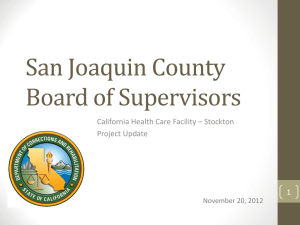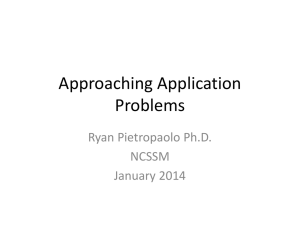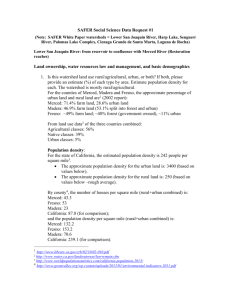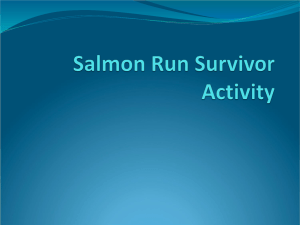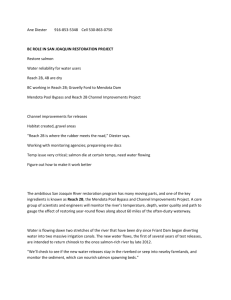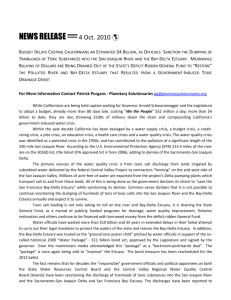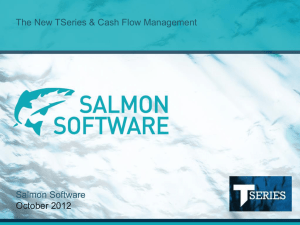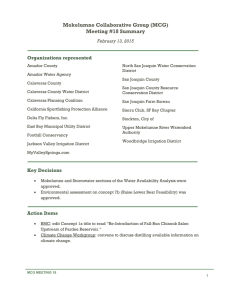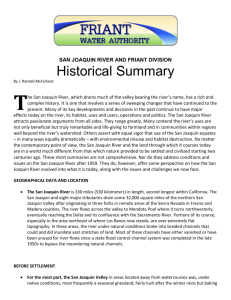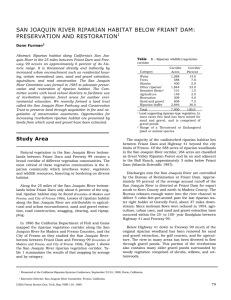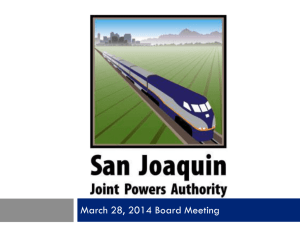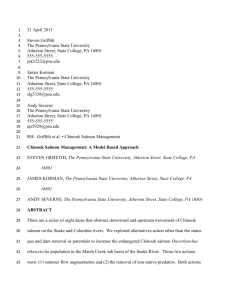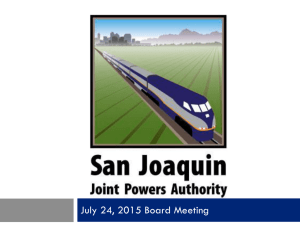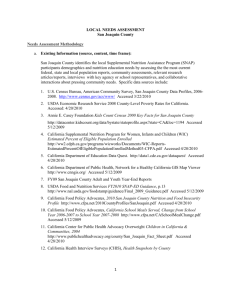San Joaquin River
advertisement
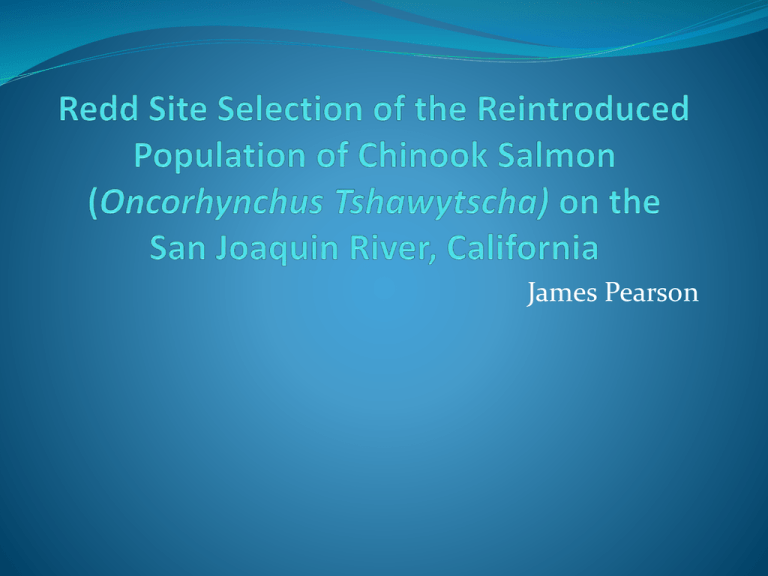
James Pearson Overview Problem Solution Hypothesis Variables Replication Type of Experiment Experimental Error Statistics Future Work Dam the rive for water storage Barren land needs water to grow crops Crops can grow Ship water via canals to areas with no water Problem Problem 60 years this is what the San Joaquin River looked like Jones, 2014 Problem That is illegal Settlement of NRDC et al. v. Kirk Rogers et al. 2006 Created the SJRRP: FMP,(2010) San Joaquin River Restoration Program (SJRRP) Restore the salmon populations and manage the water to minimize adverse affects on water users (farms) SJRRP Reintroduction Strategy (2011) Solution Bring back the salmon USBOR Reintroduce the Chinook salmon to the San Joaquin River Trapped in Reach 5A Past the Hills Ferry Barrier Hauled to Reach 1A Photos Courtesy of the United States Bureau of Reclamation Turlock, Ca Reach 5A Fresno, Ca Reach 1A Reach 1A Lake Millerton Highway 99 Spawning Survey Photo Courtesy of the Los Angeles Times (2013) Lake Millerton Highway 41 Highway 99 48% (35) 52.0% (38) Why do female Chinook salmon select certain areas to create their redds? http://dolcetours.com/LivingLaDolceVita/2011/07/11/gone-fishing/bear-salmon/ https://carlsafina.wordpress.com/page/4/ http://www.dailymail.co.uk/sciencetech/article-1051637/Fearsome-deer-hunters-No-wolves-dine-dainty-fish-dish.html In the Fall of 2014 Spawning Surveys Photo Courtesy of the Los Angeles Times (2013) Trap and Haul Hypothesis H0: Redd site selection by Chinook salmon does not vary with regard to available cover H1: Redd site selection by Chinook salmon varies systematically with regard to available cover Variables Individual Redds Depth (cm) Distance from Shore (m) Distance to pool-Riffle Crest (m) Distance to nearest Overhanging Vegetation (m) Distance to nearest undercut bank (m) Activity Area Deepest point (cm) Depth of nearest pool (cm) Activity Area Chinook Salmon arrive at spawning grounds early 30 Meters up and downstream Total activity area of 60 m Similar study w/ Coho Salmon Relative to Chinook Salmon 20 Meters up and downstream Total activity area of 40 m Clark & Dunham (2014) Replication Experimental Unit: San Joaquin River Experimental Unit: San Joaquin River Friant Dam to Skaggs Bridge Reach 1 A/B Replications: Psuedoreplications: Individual Selected (Redds) = (n) 2014: n = 73 Redds Control: Selected vs Non-Selected Selected vs. Non-Selected Type of Experiment Natural Experiment Spatial Mensurative Experiment Generality: Not DIRECTLY applicable to other rivers Study Organism Chinook salmon Lost, trapped, transported, lacking homing instinct Study River San Joaquin River Davis, 2013 Highly modified Mechanism: Survival Predator Avoidance Use of cover Scale: Large 24+ Miles Google Earth, 2014 Experimental Error Error Measurements Errors Meter Tapes, LRF, Meter Sticks Annotation Errors Potential Pitfalls Drop in water Levels Contingency: Sample b/c water drops at all sites Relying on USFWS data Wayward GPS points Contingency: None Cost Low Cost Measurements Volunteer Workers 3.79 meters Got it Distance 3.59 cm Example Stats Statistics Tests ANOVA Comparing two means No: Post hoc Tukey Test (Three or more locations) Yes: Post hoc Pairiwise T-test (Two: selected and non-selected) AIC: Akaike Information Criterion Takes the variables and makes a model Best Model which incorporates trade-off between the goodness of fit of the model and the complexity of the model Future Work Use data and Modeling Next Grad Student Determine if the SJR has enough cover This project helps the SJRRP….. Aid restoration projects More Cover? Adding Cover features Less Cover? Don’t waste money/time Special Thanks to….. Dr. Blumenshine Taylor Spaulding Kyle Griffiths Works Cited "California Climate Station Precipitation Summary." California Nevada River Forecast Center. NOAA, 03 May 2014. Web. 04 May 2014. Clark, S. M., Dunham, J. B., McEnroe, J. R., & Lightcap, S. W. (2014). Breeding site selection by Coho salmon (Oncorhynchus kisutch) in relation to large wood additions and factors that influence reproductive success. Canadian Journal of Fisheries and Aquatic Sciences, 71(999), 1-10. Cunningham, Laura (2013). A Wild San Joaquin River at the Site of Today's Friant Dam. Digital image. Blast from the Past. Earth Island Journal, n.d. Web. 18 Nov. 2014. Davis, Ken W 2013. "Putah Creek Chinook Salmon." Yolo County News. Davis Enterprise, 2 Dec. 2013. Web. 18 Nov. 2014. DeBare, Llana. "Golden Gate Birder." Restoring the San Joaquin River. Golden Gate Audubon Society, 30 Sept. 2012. Web. 04 May 2014. Fickenscher, Pete. The Friant Dam. 2006. NOAA Photo Library, Friant. "Fresno California." Google Map/Earth. N.p.: n.p., 2014. N. pag. Print. Fisheries Management Plan: A Framework for Adaptive Management in the San Joaquin River Restoration Program (2010). Draft Program Environmental Impact Statement/Report.Friant Dam. (2009). Bureau of Reclamation Homepage. Retrieved July 8, 2014, from http://www.usbr.gov/projects/PrintFacilityAttributes.jsp?fac_Name=Friant%20Dam Grossi, Mark. "For San Joaquin River Revival, Drought Becomes Way of Life." Outdoors. FresnoBee.com, 5 Apr. 2014. Web. 04 May 2014. Jones, Alison. San Joaquin River. 2014. Nowater-nolife.org, San Joaquin. Sullivan, Justin. Jerry Brown. 2014. Getty Images, Sacramento. Suzuki, Lea. Snow Pack. 2014. The Chronicle, Sacramento. Visser, Nick. "California Drought Worsens After State's Warmest Winter On Record." The Huffington Post. TheHuffingtonPost.com, 18 Mar. 2014. Web. 04 May 2014. Walker, John. Don Portz, USBOR. 2014. FresnoBee.com, Fresno. Weber, M. San Joaquin Riverbed. 2012. Fresno.


